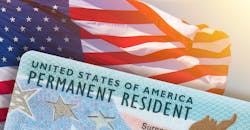The H-1B Visa Process Is Getting Easier—and Tougher
During a year of turmoil, tragedy and political change, it is perhaps not surprising that the H-1B visa program has been a hot topic. The H-1B visa allows U.S. employers to provide employment opportunities for a limited number of foreign workers in specialty occupations—including opportunities across the manufacturing industry.
At a time when pandemic-driven changes and economic volatility are introducing new complexities into an already challenging employment landscape, understanding the latest trends and developments in H-1B utilization—and how this specialized policy could impact manufacturing professionals—is more critical than ever. More importantly, monitoring events today can give us important insights into next year’s lottery—and provide employers and employees alike with some context about how to proceed going forward.
Signs of a Turnaround
The recently completed 16-day lottery application window (when employers and their representatives could submit H-1B registrations through an online portal) ended on March 25th, and winners are already being notified. Employers whose registrations are selected will be eligible to file formal H-1B petitions within 90 days following notification.
The overall number of H-1B applications appears to be up this year. Those who submitted lottery registrations but have not been notified of results can continue to hold out hope: USCIS has indicated potential for many of the allotted numbers going unused (due to denials and even some who may have violated the prohibition against filing more than one registration by each employer per worker). An announcement of a second-chance drawing from the pool of March applicants is expected soon; last year, it was held in July.
Further, there are reasons to believe there could be changes going forward. The 2020 ban on H1-B skilled workers and certain other temporary visas has expired, an encouraging sign for the H1-B program overall.
Changes and Challenges
The H1-B wage threshold is expected to rise. In early 2021, the Labor Department issued a new rule on prevailing wages, increasing the lowest required H-1B wages from the 17th percentile to the 35th percentile of all wages in the industry. This rule, however, has been delayed indefinitely.
Scrutiny of both first-time applicants and renewal candidates is also increasing. According to U.S. Citizenship and Immigration Services (USCIS), rates of requests for evidence (RFEs) exceeded 30% in the 2019-2020 period, up from 22% in 2015.
Also, COVID-related bans and travel restrictions—especially in European countries, China, and Brazil—can be a significant obstacle to employment. Quarantine periods and the need for negative COVID test to get into (or back into) the country also can be disruptive, and can dampen enthusiasm for pursuing overseas talent. Even the threat of future slowdowns or temporary shutdowns can be enough to dissuade parties on both sides from pursuing H-1B opportunities.
In addition, COVID has left most consulates significantly behind, and it is difficult to get visas processed in a timely manner. National interest exemption (NIE) cases (to circumvent the travel and entry bans) are taking up to 60 days to be processed. NIE review times were initially just 7-14 days in June 2020 when the bans were announced and the concept of requesting NIEs was first made available. The NIE issue is especially problematic, given that the NIE option has become an increasingly common recourse-of-necessity for manufacturers that have already been impacted by H-1B restrictions in recent years.
Looking Ahead
For those thinking about 2022, lottery registration is affordable and relatively straightforward: a brief application and a few hundred dollars in legal fees. Those who win then submit a more costly and time-consuming application.
Despite the challenges, the policy landscape for next year is actually looking more favorable for H-1B aspirants and the companies that sponsor them. In fact, in May 2021, USCIS announced that it will reinstate a previously abandoned policy of giving deference to its own prior decisions—meaning renewals of previously approved H-1B applications should now be streamlined. Moving forward, applicants would be smart to control what they can: meet the criteria, meet the deadlines, fill out and submit the applications, and seek out sound legal advice as needed.
Eli Maroko is a partner at business law firm Jaffe Raitt Heuer & Weiss, P.C. in Southfield, Michigan. He leads the Firm’s Immigration practice group and has more than 30 years of experience engaging in investment-based and employment-based business immigration matters.
